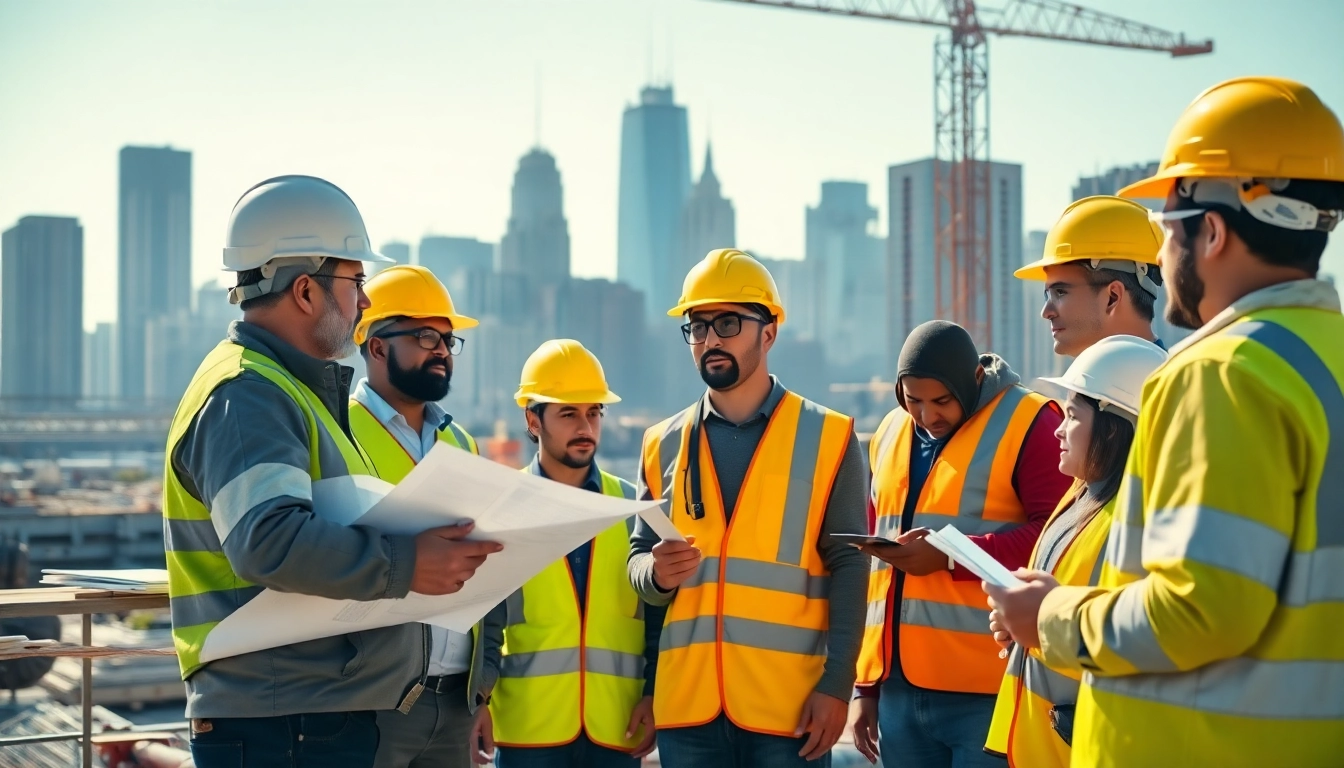Understanding the Role of New York City Commercial General Contractor
In the bustling environment of New York City, the role of a commercial general contractor is pivotal in transforming architectural visions into tangible realities. They serve as the linchpin in construction projects, ensuring that everything runs smoothly from inception to completion. A well-chosen New York City Commercial General Contractor can significantly influence the quality, speed, and cost-effectiveness of a project. This section delves into the multifaceted responsibilities, essential skills, licensure, and insurance requirements for general contractors operating in such a dynamic urban landscape.
Defining Responsibilities of a General Contractor
A commercial general contractor (GC) assumes a broad range of responsibilities that are crucial to the successful execution of construction projects. Primarily, they act as the principal agent responsible for the coordination of all activities on the site. Their responsibilities include:
- Project Planning: Collaborating with architects and designers to interpret blueprints and understand the project scope.
- Scheduling: Establishing timelines, ensuring that different phases of construction are synchronized, and managing the workforce to adhere to deadlines.
- Budget Management: Estimating costs, securing necessary funding, and controlling expenditures throughout the project lifecycle.
- Procurement: Sourcing materials and hiring subcontractors, ensuring all components meet required standards and regulations.
- Quality Control: Implementing measures to maintain high quality in construction processes and materials, adhering to building codes.
- Safety Oversight: Ensuring compliance with safety regulations, providing safety training, and maintaining a safe construction environment.
- Communication: Acting as the primary liaison between stakeholders, including clients, suppliers, and subcontractors.
Key Skills Required for Successful General Contractors
Success as a general contractor in NYC requires a diverse skill set that combines technical knowledge with interpersonal acumen. Key skills include:
- Construction Knowledge: A deep understanding of building systems, construction methods, and industry standards is vital.
- Project Management: Strong organizational skills to keep various aspects of the project under control.
- Negotiation Skills: The ability to negotiate contracts and manage relationships with vendors and subcontractors effectively.
- Problem-Solving Abilities: Quick, effective decision-making skills to address any issues that arise during construction.
- Financial Acumen: Skills in budgeting, forecasting, and financial modeling to keep the project within its planned financial parameters.
- Communication Skills: Excellent verbal and written communication abilities to articulate ideas clearly and effectively.
Importance of Licensure and Insurance in NYC
Licensure and insurance are critical components in the construction industry, particularly in New York City. The following points outline their significance:
- Licensure: General contractors must obtain the necessary licenses from the NYC Department of Buildings. This process ensures that contractors meet specific standards of competence and legal compliance, which bolsters consumer trust.
- Insurance: Adequate general liability insurance protects both contractors and clients from potential claims resulting from accidents or damages incurred during construction. Workers’ compensation insurance is also essential to cover any injuries sustained by employees on the job.
Benefits of Hiring a New York City Commercial General Contractor
Engaging a skilled commercial general contractor offers multiple advantages that can streamline the construction process and enhance project outcomes. Below are some of the notable benefits of hiring a New York City Commercial General Contractor.
Quality Assurance and Project Management
One of the significant benefits of hiring a commercial general contractor is quality assurance. Their experience and expertise ensure that every aspect of the construction meets required standards. They manage quality control processes which include:
- Site Inspections: Regular inspections help in ensuring that work complies with predetermined specifications and codes.
- Skilled Workforce: Access to a network of skilled tradespeople ensures that specialized tasks are performed to a high standard.
- Standard Operating Procedures: Implementation of best practices and standard operating procedures enhances quality control.
Access to Skilled Labor and Resources
General contractors have established relationships with suppliers and skilled labor pools. This access translates into several advantages:
- Efficient Procurement: GCs can secure materials at competitive prices and ensure timely delivery to the job site.
- Qualified Subcontractors: They often hire trusted subcontractors who specialize in various areas, ensuring high-quality workmanship.
- Resource Allocation: Effective management allows for the optimal allocation of resources, preventing overallocation or shortages at critical project phases.
Cost Efficiency in Project Execution
Contrary to the perception that hiring a general contractor adds to the costs, they can actually help save money in the long run. Here’s how:
- Avoiding Overruns: Skilled contractors have the experience to anticipate problems and allocate resources effectively, minimizing delays that can lead to cost overruns.
- Value Engineering: They can provide insights into alternative materials and methods that maintain quality while reducing costs.
- Improved Timelines: Faster project completion leads to quicker returns on investment, benefiting the overall budget.
How to Select the Best New York City Commercial General Contractor
Selecting the right commercial general contractor can significantly influence your construction project’s success. Here are several key considerations in the selection process:
Assessing Experience and Past Projects
When assessing potential contractors, consider their experience level and previous projects. Look for:
- Relevant Experience: Ensure the contractor has experience in your project’s specific type and scale.
- Portfolio Review: Examine portfolios or case studies to understand their past work quality and design aesthetics.
- Longevity and Reputation: Seek contractors who have been in the industry for some time, indicating stability and a positive reputation.
Evaluating Reviews and Client Testimonials
Reviews and testimonials can provide valuable insights into the contractor’s reliability and quality of work. Consider the following:
- Online Reviews: Platforms such as Yelp or Google Reviews can provide an overview of client satisfaction.
- When Possible, Speak Directly to Past Clients: Engaging with references allows for firsthand insights into the contractor’s process and outcomes.
- Industry Awards: Recognition by industry bodies can be a marker of excellence.
Understanding Contracts and Terms
Contracts are foundational to the success of any construction project. Consider these elements:
- Detailed Scope of Work: Ensure the contract specifies all work the contractor will undertake.
- Payment Terms: Understand the payment schedule and any contingencies related to completion milestones.
- Change Order Procedures: Ensure the process for potential changes to the project scope is clearly outlined.
Common Challenges Faced by New York City Commercial General Contractors
While general contractors strive for flawless project execution, they often encounter challenges that require strategic thinking and proactive management. Understanding these challenges can foster better problem-solving.
Navigating Local Regulations and Compliance
The NYC construction landscape is governed by a myriad of regulations that can be complex. Contractors face challenges such as:
- Permitting Delays: The permit acquisition process can be lengthy and intricate, impacting project timelines.
- Building Codes: Adhering to constantly evolving building codes demands ongoing education and diligence.
- Inspections: Coordinating inspections can introduce delays if not managed efficiently.
Dealing with Project Delays and Budget Overruns
Delays and budget overruns can have far-reaching consequences. General contractors must manage strategies such as:
- Proactive Delay Mitigation: Identifying potential delay risks early and creating contingency plans.
- Regular Budget Reviews: Conducting frequent financial reviews to identify discrepancies and inform stakeholders.
- Effective Communication: Maintaining transparent communication with clients about timelines and costs to manage expectations.
Maintaining Quality in High-Demand Environments
Given the competitive nature of NYC’s construction industry, maintaining quality can be challenging. Strategies for overcoming this include:
- Recruitment of Skilled Labor: Invest in attracting qualified professionals and retaining them through competitive compensation and a positive work environment.
- Enhanced Training Programs: Regular training ensures that the workforce is up-to-date with the latest practices and technologies.
- Quality Assurance Processes: Implementing robust quality control measures at every stage of construction helps ensure a high standard.
Future Trends in the New York City Commercial General Contractor Industry
The construction industry is continually evolving, necessitating adaptability among contractors. Being aware of emerging trends can position general contractors for future success.
The Impact of Technology on Construction Practices
Adopting new technologies is changing how construction is approached. Key aspects include:
- Building Information Modeling (BIM): Enhancing collaboration through detailed 3D modeling that enables more accurate planning and visualization.
- Project Management Software: Utilizing software tools for tracking progress, timelines, and costs in real-time.
- Drones and UAVs: Employing drones for site inspections and surveying offers improved accuracy and time management.
Green Building and Sustainability Trends
As environmental concerns gain prominence, sustainable building practices are on the rise. Key developments include:
- Energy-Efficient Design: Leveraging technology to design buildings that minimize energy consumption.
- Green Certifications: Pursuing certifications such as LEED (Leadership in Energy and Environmental Design) that enhance building sustainability and marketability.
- Use of Recycled Materials: Incorporating sustainable materials reduces the environmental impact of construction.
Adapting to Economic Shifts and Urban Development
Economic trends directly affect construction demand. Contractors must develop strategies to adapt:
- Market Analysis: Keeping a pulse on market conditions to predict changes in demand and adjust business strategies accordingly.
- Diversity in Project Types: Expanding service offerings to include various project types can help insurance against economic downturns.
- Community Engagement: Involving the community in planning and development initiatives fosters goodwill and partnerships.
In conclusion, the role of a New York City Commercial General Contractor is complex and multifaceted, influencing not only the projects they manage but also the communities they serve. By understanding the responsibilities, benefits, and challenges associated with this profession, businesses and investors can make informed choices that lead to successful construction endeavors in the dynamic New York City landscape.



